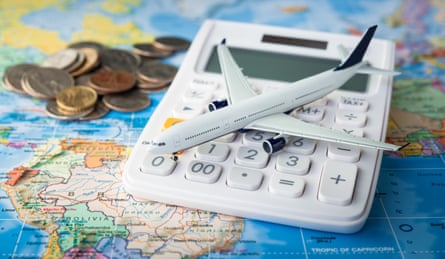
It’s cold outside, so it’s little wonder that in January, many people’s thoughts turn to holidays. Travel agents have already reported a strong start to the year – Skyscanner, a website selling flights and hotels, says it had record demand in the first week of 2024.
If you haven’t yet booked a break but are considering doing so this month, here is our guide to getting a good deal on a holiday – and what you can do to future-proof your booking.
How do I get the best deal on my holiday?
The good news for those looking now is that, when it comes to summer holidays, research by the consumer group Which? found that January is one of the cheapest times to buy.
Which? checked the prices of thousands of short-haul package holidays offered by Jet2holidays and Tui. It priced up trips departing between 18 and 24 July 2023 five times: in October, November and December 2022, and in January and July 2023.
For half of the six destinations it looked at – Greece, Turkey and Portugal – prices were at their lowest in December, on average. January was typically the second-cheapest month to book a trip to these destinations, and it was also the cheapest month to book an Italian holiday. Spain and the Canary Islands were the exceptions: booking in advance was typically pricier than booking at the last minute.
While those destinations are always popular, widening your search could help you get a bargain. Skyscanner says “everywhere” is currently the most popular destination on the site, with searches up by 73% year on year. Key in some dates and hit its “explore everywhere” button, and you will see the cheapest flights to various places, ranked by price.
If you are able to travel soon and are flexible, there are some real bargains. This week for return flights from London, leaving on 27 January and returning seven days later on 3 February, it suggested return flights to destinations ranging from Malta to Morocco for under £30. Deals included a return Ryanair flight from London Stansted to Stockholm for £27.98 (that is a basic “travel light” deal).
The website says some flight prices have fallen sharply over the past 12 months: those to Faro in Portugal are down by a quarter, and elsewhere in Europe, Nice is also cheaper to get to than it was. The cost of flights to the US cities of Boston and Los Angeles have fallen by 10%, so somewhere you ruled out last year may now be within your budget.
Eurostar is one operator where, if you hold your nerve, you can sometimes get significantly cheaper tickets at the last minute. On Tuesday it put thousands of extra seats on sale for trips from London to Paris, Lille and Brussels between 24 January and 27 March, priced at from £39 each way. There will be many people who have already booked who will have paid twice as much for the same journey.
To cut the cost of your break you may want to pick somewhere where the pound is strong against the local currency. At the time of writing, sterling was up by about 66% against the Turkish lira since January last year. Against the Japanese yen and Egyptian pound it was up by about 19% and 8% respectively. It’s worth keeping a close eye on exchange rates.
How can I make sure nothing ruins my plans?
As we’ve all learned in recent years, you can’t – this time four years ago, no one in the UK would have imagined a global pandemic would spoil their Easter break. What you can do is make sure you have as many safety nets in place as possible if you do have to change your plans.
Booking.com and Expedia are among the sites that let you search for hotels and apartments offering free cancellation. The cut-off time for when this ends will vary – with some, you can cancel up to a week or perhaps two weeks before, and with others it is 24 or 48 hours before check-in.
Typically you pay more for free cancellation: when we randomly picked a few Paris hotels on Booking.com that advertised different prices for the same room depending on whether you choose free cancellation or a non-refundable booking, the premium varied widely – from 2% to 18%.
But a big advantage of selecting free cancellation is that you can keep checking the websites and hop over to a new deal if the price later falls or you find something cheaper. This strategy can also work with things such as car hire.
Traditional package holidays may feel rather passé but they are very much à la mode when it comes to consumer protection. All UK companies selling holidays with air travel must be signed up to the Air Travel Organisers’ Licensing (Atol) scheme. To get its protection, you need to book a combined flight and hotel package with a UK-based firm.
If the tour company or airline goes bust before or during the holiday, you should be offered an alternative, a refund, or repatriation if you are away. You also get legal protection, meaning you are covered if you don’t get the holiday you paid for – for example, if the hotel is overbooked or promised facilities, such as a pool, that don’t exist. Before you pay for the holiday, check the Atol website to confirm your chosen operator is protected, particularly if it is a small, unknown company.
Since 2018, a similar protection has applied to some flight and hotel bookings that might be supplied by different operators, provided they are booked simultaneously by the travel agent or website. The agent should provide you with your Atol certificate. Cruise bookers who start in the UK and therefore take no flight should use an Abta-registered provider for similar protection.
The Civil Aviation Authority says it is important to protect your Atol certificate once you have received it, and to take it with you when you travel, either by downloading it or taking a physical copy.
Always use a credit card when booking holidays, flights and hotels (or anything else that can go wrong). This is because when the transaction is more than £100, section 75 of the Consumer Credit Act means the card company is equally liable with the retailer or supplier if something goes wrong.

If, say, the airline goes bust and you have booked directly with it, you can at least get your money back from the card company. To get section 75 protection, you have to have used the card to pay the supplier directly. You don’t get it if you used an online travel agent such as Expedia or Lastminute.com to book a flight. If you need the protection, always book direct – particularly if using airlines in far-flung spots that might be at risk of collapsing.
Banks are very reluctant to pay out on these claims and sometimes do everything they can to avoid doing so, but this can be a financial lifesaver.
Watch out for flight time changes
When you book a flight, the time is not set in stone, and where schedule changes are made to the time or date (not the flight number), these are covered by airline terms and conditions, not by any law.
Ryanair, for example, says it tries to notify customers of a rescheduled flight at least 90 days before their outbound flight or as soon as possible. If your flight changes and it is not suitable, the budget airline says you can switch it to a new time or date on the same route for free or apply for a refund.
Given that a flight time change might derail your plans, it is worth monitoring your booking in your airline’s app in the weeks leading up to your trip.
This week, meanwhile, it was confirmed that thousands of Wizz Air passengers had received a total of £1.2m owed to them after the airline was taken to task by the CAA over its shoddy refund record. Among other things, passengers complained it did not help them in the aftermath of cancelling their flights. The airline has now changed its policies so as to meet its rerouting and care obligations, the regulator said. Guardian Money still gets lots of complaints about poor customer service at Wizz Air, especially regarding glitches with its online check-in. If you opt to fly Wizz Air, maybe expect the worst and hope for the best.
What about travel insurance?
Arguably the biggest mistake people make is to book an expensive holiday and then wait until the last minute to buy travel insurance.
By buying both at the same time, you will get the all-important cancellation cover, which should step in if a serious accident or illness involving one of those going on the trip, or a close family member, prevents the holiday from going ahead.
Finn Walsh, the chief executive of the travel insurer Staysure, says: “Most single-trip policies provide cancellation cover from the moment you purchase the policy… If you opt for an annual policy, you can select the policy start date and delay it up to 90 days from the policy purchase date but cancellation cover will only begin when your policy commences.”

This isn’t an issue if your trip is full refundable – you will be covering your personal possessions and emergencies while you are away, so the policy does not need to start until you travel.
Walsh says if you buy a policy with cancellation cover now, you may end up spending more as the risk of something go wrong is greater than if you leave it to the last minute. But he says: “Insurance costs do fluctuate throughout the year.”
If you book your flights and accommodation separately, buy a policy that includes scheduled airline failure insurance. This will step in if your airline goes bust before you get to go on board, as well as covering the usual medical emergencies once abroad.
How to handle the baggage bills
It is considerably cheaper to book your luggage allowance in advance than it is to pay at the airport. Some operators charge the same whether you do this when you book the holiday or the day before you travel, but some may charge more if you choose to add bags later: easyJet, for example, warns: “Prices may vary if you add bags at a later stage.”
Generally, these charges are unavoidable unless you plan to travel very light. The fact that different airlines have different allowances makes it really hard to compare the full cost of a flight.
We looked at the cost of a flight from London to Madrid over the Easter weekend (28 March-2 April). To travel with one bag measuring only 40cm x 20cm x 25cm on Ryanair costs £143.73 return. Opting for a larger bag that fits in the overhead lockers adds £32.25 each way, making a total of £208.23. Checking in a bag increases the cost to £246.21.

It used to be that it was only the original no-frills airlines that had an extra fee for bags, and that sometimes it worked out cheaper to go for an older carrier that included luggage as standard. However, now it is normal for the costs to be added to the ticket price you are first quoted.
For that same trip to Madrid, British Airways, operated by Iberia, charges £274.79, which includes two items of hand baggage – one measuring up to 56cm x 45cm x 25cm and one up to 40cm x 30cm x 15cm. Checking in a bag brings the cost to £306, if you book in advance.
The maximum weights vary across airlines. BA is typically most generous, allowing 23kg of cabin hand luggage and in your check-in bag. If you want to carry more than 20kg in your checked-in bag with Ryanair, the costs will start adding up.



